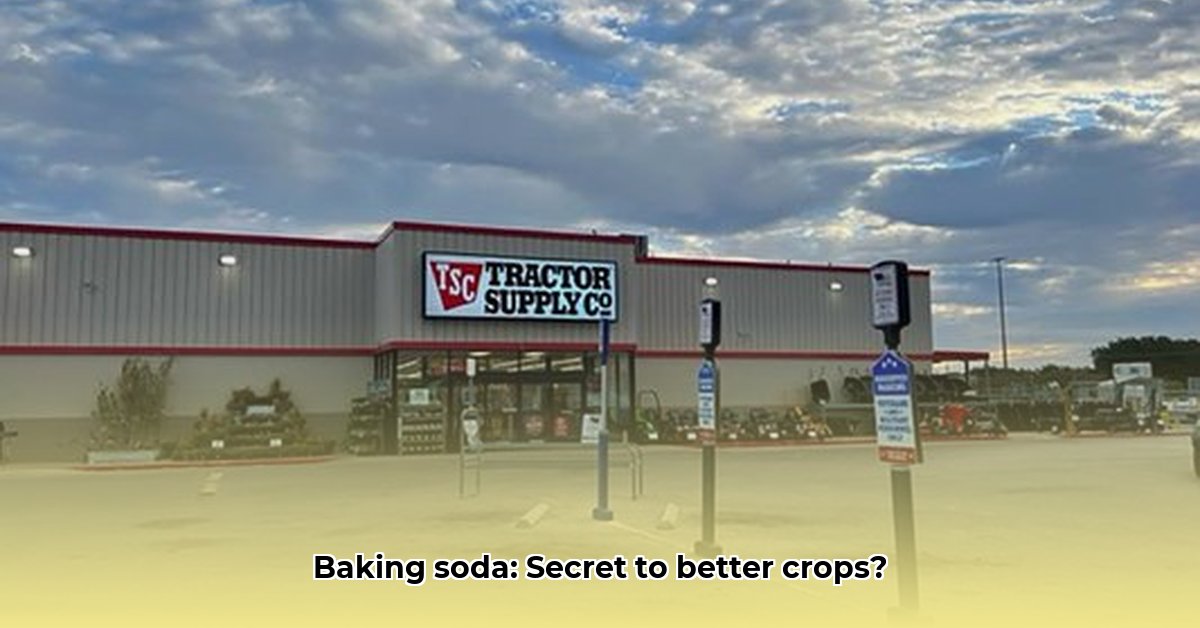
Understanding Soil pH: The Foundation for Healthy Plants
Soil pH, a measure of acidity or alkalinity, significantly impacts plant growth. Most plants thrive in a slightly acidic to neutral range (pH 6.0-7.0). Too acidic (low pH), and plants struggle to absorb essential nutrients. Too alkaline (high pH), and nutrient uptake is similarly hampered. Think of pH as the key unlocking your plants' access to a healthy meal. A simple, readily available soil testing kit reveals your soil's current pH, providing crucial information for informed decisions. Without this vital knowledge, you're essentially farming blind. For more on suitable containers, check out these planting pots.
Baking Soda from Tractor Supply: A Budget-Friendly Soil Amendment?
Tractor Supply's baking soda (sodium bicarbonate) offers a potentially cost-effective way to raise soil pH, neutralizing acidity and improving nutrient availability. It's a readily available, inexpensive alternative to lime, a traditional soil amendment. However, it's crucial to understand that baking soda isn't a magic bullet; its effectiveness is limited and improper use can lead to issues.
Advantages: Baking soda is cheap and easily accessible at Tractor Supply and many other retailers. It can provide a quick fix for small areas with low pH.
Disadvantages: Overuse can lead to salt build-up, potentially harming plants. It may disrupt beneficial soil microbes. It’s not a long-term solution and may not be suitable for all soil types or plants. Its effects are temporary compared to other amendments like lime.
A Step-by-Step Guide to Using Baking Soda to Adjust Soil pH
Important Note: Always test your soil's pH before starting! Begin with a small test area to observe your soil's reaction before treating a larger area.
- Test Your Soil's pH: Use a soil testing kit (available at Tractor Supply and garden centers) to determine your soil's current pH. Follow the kit's instructions precisely for accurate results.
- Calculate the Amount: Determining the precise amount of baking soda needed is crucial. This depends heavily on your soil type, current pH, and desired pH level. A professional soil testing service can provide accurate recommendations. Start with a small amount— it's better to add more gradually than risk damaging your plants.
- Mix and Apply: Gently mix the calculated amount of baking soda into the top layer of soil, ensuring even distribution to prevent localized high concentrations.
- Water Thoroughly: Water gently but thoroughly to help dissolve and distribute the baking soda. Avoid overwatering, which could wash it away.
- Monitor and Adjust: After a few weeks, retest your soil's pH. You may need to repeat the application to achieve the desired pH. Patience and careful monitoring are crucial.
Long-Term Soil Health: A Holistic Approach
While baking soda can offer a temporary pH boost, it's not a sustainable, long-term solution for maintaining healthy soil. Sustainable agriculture requires a holistic approach, including regular soil testing, crop rotation, and the incorporation of organic matter. Baking soda is a tool in your toolbox, helpful in specific circumstances but not a replacement for comprehensive soil management. A balanced approach is key to long-term soil health.
Alternative Approaches: Beyond Baking Soda
Baking soda might offer a quick fix, but other amendments provide longer-lasting and more comprehensive soil improvement. Lime, for instance, is a more sustainable option for long-term pH management, also providing essential calcium and other minerals beneficial to soil health. Consider consulting with local agricultural experts for personalized advice based on your specific soil conditions and long-term farming goals.
Key Takeaways:
- Baking soda can temporarily raise soil pH.
- Thorough soil testing is paramount before application.
- Start with small amounts and monitor carefully.
- Baking soda is a short-term solution; consider other amendments for long-term soil health.
- A holistic soil management approach is crucial for sustainable farming.